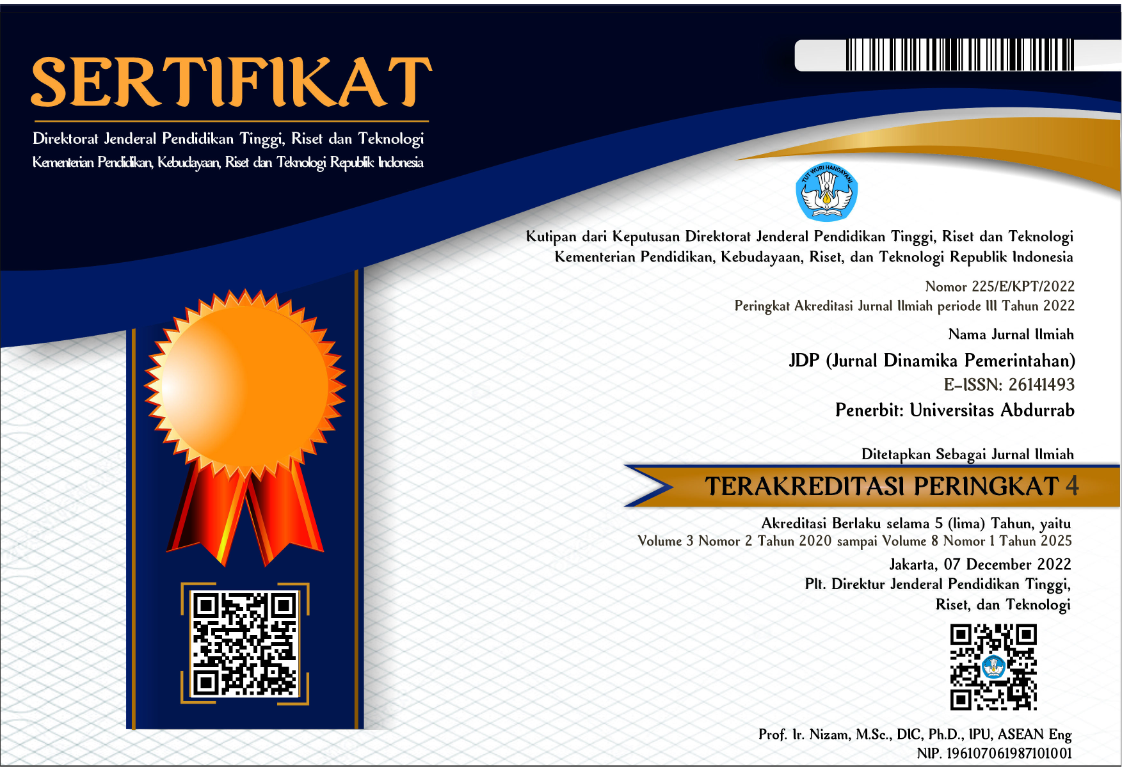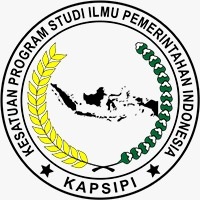ADAPTASI IDENTITAS KEPENDUDUKAN DIGITAL (IKD) OLEH GENERASI BABY BOOMERS DAN GENERASI X DI KABUPATEN KAMPAR
DOI:
https://doi.org/10.36341/jdp.v7i2.5006Keywords:
Adaptation, Digital ID, Governance, Baby Boomers, Generation XAbstract
After the establishment of policies related to the digitization of Identity Cards in Kampar Regency, the government needs cooperation and community participation. The government needs to pay attention to the people who will accept the ID card digitization policy seen from generational differences. The Baby Boomers and X generations in the development of digitization technology can be divided into four categories based on internet usage: 1) internet illiterate, 2) master but not reliable, 3) rely blindly, and 4) rely but not master. These categories indicate the level of ability and dependence of these generations on the internet as a source of information. Based on the phenomenon of the habits of the Baby Boomers and Generation X who are not sensitive to the presence of technology, this study aims to see how digitalization for the Baby Boomers and Generation X generation in Kampar Regency in adapting and accepting the development of digitalization technology by the government. This research uses a qualitative method by involving Baby Boomers and Generation X people in Kampar Regency as informants in this research. Data collection in the study used purposive sampling. The results of this study are the adaptation of the Baby Boomers and Generation X to the adaptation of Digital Population Identity The Baby Boomers generation tends to face greater challenges in adaptation, with education level and type of employment playing a crucial role. Those who work in digitized environments or have higher education show better adaptation, while those who work in traditional sectors or have lower education experience greater difficulties. On the other hand, Generation X shows greater flexibility and willingness to adapt, driven by an awareness of the importance of technology in modern work. Although education level is also influential in Generation X, the adaptation gap is not as wide as in the Baby Boomers. Both generations recognize the potential benefits of Identity.
Downloads
References
Adibah, Hikmia Umayatul. 2021. “Motivasi Kerja Guru PNS Selama Pandemi Covid-19.†PROSIDING Temu Ilmiah Nasional (November): 145--15. https://www.researchgate.net/publication/355808066.
Al-Maroof, Rana Saeed, Aseel M Alfaisal, and Said A Salloum. 2021. “Google Glass Adoption in the Educational Environment: A Case Study in the Gulf Area.†Education and Information Technologies 26: 2477–2500.
Al-Zahrani, Mohammed. 2020. “Integrating IS Success Model with Cybersecurity Factors for E-Government Implementation in the Kingdom of Saudi Arabia.†International Journal of Electrical and Computer Engineering 10(5): 4937–55.
Alfarizi, Muhammad. 2023. “Digitalisasi Kartu Tanda Penduduk Dan Partisipasi Milenial-Gen Z: Investigasi Penerimaan Transformasi Digital Dalam Kebijakan Kependudukan Indonesia.†Jurnal Studi Kebijakan Publik 2(1): 41–54.
Amanda, Defi Tiara, Rachmawati Novaria, and Adi Soesiantoro. 2024. “Pengaruh Tingkat Kesiapan Masyarakat Terhadap Penerapan Program Identitas Kependudukan Digital (IKD) Desa Dinoyo Kecamatan Jatirejo Kabupaten Mojokerto Tahun 2024.†PRAJA Observer: Jurnal Penelitian Administrasi Publik 4(3): 4–6.
Anshari, Alif Arifzan. 2022. “Studi Kasus Adaptasi Generasi X Dan Generasi Z Terhadap Penggunaan Aplikasi Grab Dan Gojek Di Kota Malang.†LoroNG: Media Pengkajian Sosial Budaya 11(1): 44–57.
Baswedan, Anies Rasyid. 2004. “Political Islam in Indonesia: Present and Future Trajectory.†Asian Survey 44(5): 669–90.
Cao, Qian, and Xiaofei Niu. 2019. “Integrating Context-Awareness and UTAUT to Explain Alipay User Adoption.†International Journal of Industrial Ergonomics 69: 9–13.
Croissant, Aurel, David Kuehn, Philip Lorenz, and Paul W. Chambers. 2013. Democratization and Civilian Control in Asia. New York: Palgrave MacMillan.
Cuadrado-Ballesteros, Beatriz, Serena Santis, and Marco Bisogno. 2022. “Public-Sector Financial Management and E-Government: The Role Played by Accounting Systems.†International Journal of Public Administration 45(8): 605–19.
Dhagarra, Devendra, Mohit Goswami, and Gopal Kumar. 2020. “Impact of Trust and Privacy Concerns on Technology Acceptance in Healthcare: An Indian Perspective.†International journal of medical informatics 141: 104164.
Fadillah, Nadiya Asyri Nur, Rahayu Kusumadewi, and Nanang Suparman. 2022. “Digital Government Dalam Pelayanan Kependudukan Melalui Aplikasi Sakedap Di Kabupaten Bandung.†Jurnal Inovasi Penelitian 2(12): 4067–82.
Hubert, Marco et al. 2017. “Acceptance of Smartphoneâ€based Mobile Shopping: Mobile Benefits, Customer Characteristics, Perceived Risks, and the Impact of Application Context.†Psychology & Marketing 34(2): 175–94.
Kang, Jee-Won, and Young Namkung. 2019. “The Role of Personalization on Continuance Intention in Food Service Mobile Apps: A Privacy Calculus Perspective.†International Journal of Contemporary Hospitality Management 31(2): 734–52.
Krick, Tobias et al. 2019. “Digital Technology and Nursing Care: A Scoping Review on Acceptance, Effectiveness and Efficiency Studies of Informal and Formal Care Technologies.†BMC health services research 19: 1–15.
Li, Yan, and Huping Shang. 2020. “Service Quality, Perceived Value, and Citizens’ Continuous-Use Intention Regarding e-Government: Empirical Evidence from China.†Information & Management 57(3): 103197.
Mees, Heleen L P, Caroline J Uittenbroek, Dries L T Hegger, and Peter P J Driessen. 2019. “From Citizen Participation to Government Participation: A n Exploration of the Roles of Local Governments in Community Initiatives for Climate Change Adaptation in the N Etherlands.†Environmental Policy and Governance 29(3): 198–208.
Mensah, Isaac Kofi, and Chuanyong Luo. 2021. “Exploring Factors Determining Chinese College Students’ Satisfaction with E-Government Services: The Technology Acceptance Model (TAM) Approach.†Information resources management journal (IRMJ) 34(3): 1–20.
Mensah, Isaac Kofi, Guohua Zeng, and Chuanyong Luo. 2020. “E-Government Services Adoption: An Extension of the Unified Model of Electronic Government Adoption.†Sage Open 10(2): 2158244020933593.
Moleong, Lexy J. 2007. “Metodologi Penelitian Kualitatif Edisi Revisi.â€
Mukamurenzi, Solange, Ã…ke Grönlund, and Sirajul M Islam. 2019. “Improving Qualities of Eâ€government Services in Rwanda: A Service Provider Perspective.†The Electronic Journal of Information Systems in Developing Countries 85(5): e12089.
Paramitha, Fransisca, and Patricia Editha Adrijanto. 2023. “Adaptasi Perilaku Berbelanja Daring Generasi X Di Masa Pandemi.†Jurnal Impresi Indonesia 2(7): 622–35.
Pérez Chacón, Sebastián Ramón et al. 2021. “Increasing E-Government Adoption by Emphasizing Environmental Sustainability: An Extended Case Study in Peru.†Transforming Government: People, Process and Policy 15(4): 550–65.
Rozan, Zainur Rifqi, and Athanasia Octaviani Puspita Dewi. 2022. “Penggunaan Internet Sebagai Sumber Informasi Pada Generasi Baby Boomer Berdasarkan Kemampuan Literasi Informasi.†Anuva: Jurnal Kajian Budaya, Perpustakaan, dan Informasi 6(1): 23–42.
S, Anryana, Ahmad Yamin, and Muhammad Nur Fietroh. 2024. “Penerapan E-Government Melalui Aplikasi Identitas Kependudukan Digital Pada Dinas Kependudukan Dan Pencatatan Sipil Kabupaten Sumbawa Barat.†JIIP - Jurnal Ilmiah Ilmu Pendidikan 7(1): 188–93.
Samuels, David J., and Matthew S. Shugart. 2010. Presidents, Parties, and Prime Ministers: How the Separation of Powers Affects Party Organization and Behavior. Cambridge: Cambridge University Press.
Saputra, Ramadhan Rizki. 2023. “INFOGRAFIS : Jumlah Pemilih Pemilu 2024 Berdasarkan Usia.†CNN Indonesia. https://www.cnnindonesia.com/nasional/20230711154230-620-972133/infografis-jumlah-pemilih-pemilu-2024-berdasarkan-usia.
Shaw, Norman, and Ksenia Sergueeva. 2019. “The Non-Monetary Benefits of Mobile Commerce: Extending UTAUT2 with Perceived Value.†International journal of information management 45: 44–55.
Srivastava, Shirish, and Thompson Teo. 2009. “Citizen Trust Development for E-Government Adoption and Usage: Insights from Young Adults in Singapore.†Communications of the Association for Information Systems 25: 359–78.
Widagdo, Putut Pamilih. 2016. “Pengaruh Kesesuaian Teknologi Terhadap Tugas Terhadap Kinerja Individu Pada Generasi Baby Boomers (1945-1964) Dalam Menggunakan Teknologi Informasi (Studi Kasus : Universitas Mulawarman).†Informatika Mulawarman : Jurnal Ilmiah Ilmu Komputer 11(2): 54.
Yani, Akhir. 2023. “Pemkab Kampar Targetkan 25 Persen Dari Wajib KTP Sudah Punya KTP Digital.†cakaplah.com. https://www.cakaplah.com/berita/baca/99485/2023/06/13/pemkab-kampar-targetkan-25-persen-dari-wajib-ktp-sudah-punya-ktp-digital#sthash.yVSTbaSr.dpbs.
Downloads
Published
Issue
Section
License
1. Copyright of all journal manuscripts is held by the JDP (Jurnal Dinamika Pemerintahan)
2. Formal legal provisions to access digital articles of electronic journal are subject to the provision of the Creative Commons Attribution-ShareAlike license (CC BY-NC-SA), which means that JDP (Jurnal Dinamika Pemerintahan) is rightful to keep, transfer media/format, manage in the form of databases, maintain, and publish articles.
3. Published manuscripts both printed and electronic are open access for educational, research, and library purposes. Additionally, the editorial board is not responsible for any violations of copyright law.
licensed under a Creative Commons Attribution-ShareAlike 4.0 International License.













